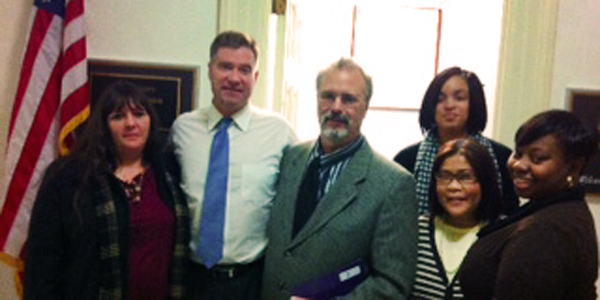Hudson Valley/Capital Region Activists Participate In Washington, D.C. Day of Action
January 3, 2013
1199SEIU members from the Hudson Valley and Capital Region flew to Capitol Hill in Washington D.C for December’s National Day of Action. They were among hundreds of SEIU members from across the country who spoke to lawmakers about the dangers of program cuts to Medicaid, Medicare, Social Security and the National Institute of Health.
Rick Salie, a delegate at Nathan Littauer Hospital and Nursing Home in Gloversville, NY, said he was particularly concerned that cuts to Medicaid and Medicare would disproportionately effect rural areas.
“I spoke with Congressman Bill Owens and Congressman Tom Reed who both represent areas in rural New York,” Salie reported. “Cuts to Medicaid and Medicare would mean loss of jobs and loss of healthcare services. Our economy is hurting in Gloversville—we can’t afford to lose any jobs. And many people already have to travel long distances to access the health care they need. We need to fix these problems, not make it worse by slashing critical programs”
Vassar Brothers Medical Center delegate Tamoya Norwood was a political activist in November’s 2012 election. “Our work doesn’t stop after election day,” she said. “I went to Washington, DC to lobby and hold our representatives accountable. Millions of senior citizens, children, people who have disabilities--and every one of us who is a healthcare worker--depend on one or all of Medicare, Medicaid and Social Security. Polling shows that 70 percent of voters strongly oppose cutting Medicaid in the name of deficit reduction. The voters spoke up in favor of these programs in November. In New York, we proved it at the polls and voted out the Tea Party people and their austerity budgets.”
The Day of Action agenda also supported funding to the National Institute of Health (NIH). Universities, hospitals and research institutions depend on NIH to hire laboratory personnel and train scientists. NIH funds about 50,000 grants a year that pay for 325,000 scientists at over 3,000 research and teaching institutions, including John Hopkins and Columbia universities. Cuts to the NIH would thwart efforts to advances in health care treatment.


